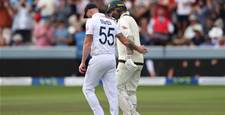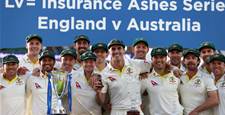The biggest obstacle standing between the Poms and Ashes glory are... The Poms
By Robert Drane (Editor, Inside Cricket)
“There think yoo should be prayersing them all thí taime!” moaned Geoff Boycott, who rarely praises anyone, in lugubrious Tyke. “Ow thee 'ell d'ye prayers perfawminces lark thart?” Never more at home than when English cricket’s prospects are as chill as the Wolds in winter, Boycott went on to appreciate how lucky the Aussie team is to have sunny ex-champions like Shane Warne buzzing about, reincarnated sledgers, letting them know when they've gone to crap. The English team "need soom of tha'," droned Boycs.
But his observation that it was ego - voracious as Warney of old, that ate all the praise and when the larder was empty, embarked on an orgy of self-consumption was most telling. The Aussies have mirrors held up to them wherever they look. The English avert their eyes from Boycott's - it's never flattering. His latest offering is that Alastair Cook is "oop his own arse", tactically flawed, devoid of "cricketing nous". His point is that what passes for mirrors in English cricket is a pond of Narcissus.
Why has the gap widened so suddenly? When they landed here in 2013, fresh from Ashes conquest at home, the look of their strapping, history-making troops was enough to suggest they might triumph again, even if the Aussies took it to them. Instead, they disintegrated like an Oasis reunion, making their own wonder, as their own do at the drop of a hat, whether they deserved the honours history - and in some cases the Queen - had bestowed. It was unexpected, to those unfamiliar with the bipolar nature of English cricket these days. It feels as though psychology - not talent, structure, leadership or management - has been the dominant talking point in English cricket since the 1970s.
Not that Australia has been lacking in the stuff. Their trajectory over the last five years has been anything but reliable. But even in those crepuscular seasons post-2006, Australia had enough aces in the pack to act out of turn and keep them wondering. Now they have a handful, but there are questions. Steve Smith, uncharacteristically ahead of himself, recently stated: "If we continue to play the same way we've played over the last 12-18 months, I don't think they'll come close to us, to be honest." That assessment obviously doesn't include Dubai, October-November 2014, where, against one of the world's worst teams, Pakistan, Australia's batsmen demonstrated that, caught on the "wrong" pitch, they'd barely see the first drinks break in a timeless Test. Their bowlers, meanwhile, found wickets as scarce as kosher pork brisket at a halal butcher shop.
Examples of Australians being unable to play swinging and spinning balls on other people's pitches notwithstanding, most of their issues seem to have been located between their ears. Dubai was not so much about talent as tactics and, many say, preparation. Regrettably, history books don't make such distinctions. Dubai suggested a few things:
1) They don't always bat well in unfavourable conditions, even against weak opposition.
2) Michael Clarke, a good tactical captain, occasionally runs out of ideas in battles of attrition.
3) They don't give up, even if they're persisting in the wrong ways.
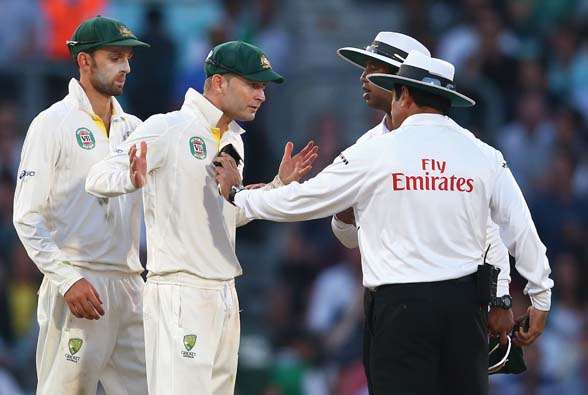 Remember what happened on the 2013 tour? Clarke and Watson sure do. Clarke got frustrated. Which happens when you've never won an Ashes series over there... (Photo by Getty Images)
Remember what happened on the 2013 tour? Clarke and Watson sure do. Clarke got frustrated. Which happens when you've never won an Ashes series over there... (Photo by Getty Images)Have they moved on in seven months? The Australians have been "rebuilding" since 2006. Could they be said to be built to specification now? Two years ago they werent even on the plan. After the 2013 Indian tour, everyone was out of clues. They've come a long way since, on many levels. People credit the coach, which means blame isn't far away. This current period might be Darren Lehmann's biggest trial. The Aussies lost over there in 2013, but performed better than expected; they then beat the Poms here, went to South Africa and defeated the world champions on their dungheap - a magnificent accomplishment in conditions not dissimilar to their own. Then the dubiety of Dubai ...
Doubters think the team's current success might end after this Ashes bout, as it did post 2006-07, when a bunch of seniors retired. Australia will be relying on mid-30s players again. But these comparisons are superficial. Young champions have ripened quickly this time and have the look of fixtures, Lyon is growing into his job, high-quality all-rounders and a bevy of first-rate quicks with international experience await.
The recent West Indies series has been a pre-Ashes testing ground in foreign conditions; an opportunity for the Aussies to inoculate themselves against that robust little virus of doubt. We should never discount the power of inability to travel to deflate a team's growing bravado like a Patriots football - just enough.
This English team is somewhere else entirely. The Caribbean was the place where England's momentum thumped to a stop in that final, farcical Test. The mini-series was badly scripted; England's shortcomings emphasised stagily in overstated vignettes: James Anderson's over-celebration upon the breaking of Botham's record (ambiguity intended: he over-celebrated and was over-celebrated); Stokes' bait-taking petulance; coach Peter Moores, buoyant after the second Test win, twitchy and gloomy after the third; Trott's dejected comeback and abject retirement; missed selection opportunities - all set against a background of constant KP chatter. All bad auguries.
After the series, everyone was justifiably convinced Moores was about to take the long fall - again. He continued, disconsolate but doughty, strolling through the rye, not a catcher in sight. Everyone was talking Gillespie, seeking the powerful magic the Aussies pulled out of their proverbials in 2013.
Andrew Strauss came into the newly created job of director of English cricket. People believed Michael Vaughan - Strauss' predecessor as England's captain, and one of its most successful ever - was better suited. He has the requisite qualities, and he's a little more remote from current players. It's generally believed Strauss is still a chum, his emotional propinquity setting things up for cronyism on one hand, fallings-out on the other. Accordingly, Strauss bungled the final dismissal of Pietersen from international calculations, and sacked Moores after a considered delay of four seconds. We all found out about Moores' ejection before he did - a typically English diplomatic debacle.
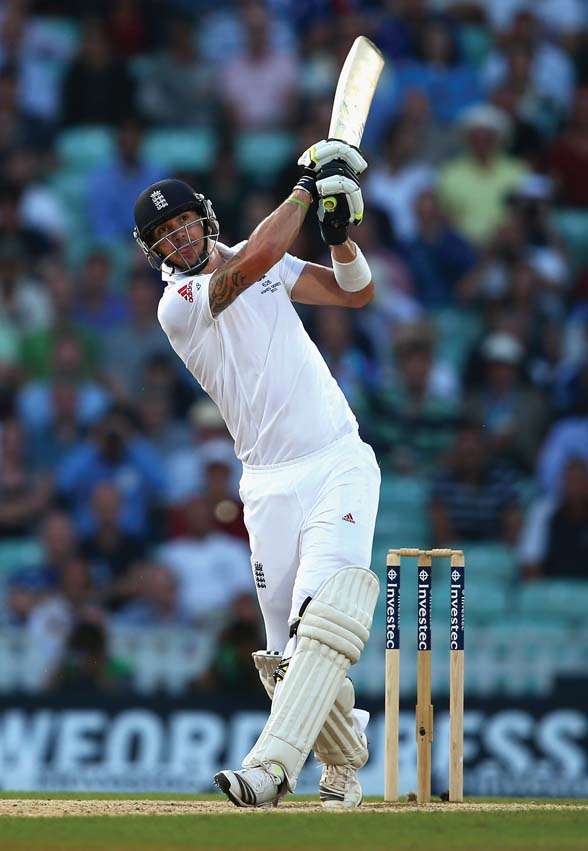 England's best batsman, Kevin Pietersen, beating us last time. But not this time... (Photo by Getty Images)
England's best batsman, Kevin Pietersen, beating us last time. But not this time... (Photo by Getty Images)Scheming politics were the reason for Vaughan's hesitancy. Pity. England needed to bask in the lambent glow of a familiar, much-loved winner for a while. Strauss fits that bill as well, but seems to have a prudence problem. His difficulties began as soon as he informed Pietersen he'd never be selected for England again. Strauss has "a history" (his phrase) with Pietersen. Cook can't stand being on the same continent. There were "trust issues". It wasn't going to work. That was fine: decisive, cruel but fair. Then Strauss let slip that he'd offered Pietersen some kind of T20 and one-day cricket advisory role. What that revelation was meant to achieve is a mystery, but it attained bathetic depths. Hypocrisy, though an overrated vice, stays like rust once discharged. Twitter went bristly with hashtags, notably #StraussLogic, and cricket luminaries from all over the world, including the ever-gracious Pietersen himself, joined in. Some were so trenchant, we wonder what they thought of Strauss as a playing opponent.
The Trott tale, from his stress-related syndrome to his re-instalment, seems a metaphor for everything English about English cricket. Kumar Sangakkara opined that Trott's return "wasn't ideal", because he batted in an unfamiliar position, and because the "culture" of the side had become "overly intense". While youngsters like Sam Robson and Nick Compton have waited inexplicably in the wings, both having performed well with Cook as openers, Trott, the specialist first-drop, was brought back, installed as an opener, promptly failed, then retired.
Classically illogical. When the English stop making sense, it makes for great comedy and lousy cricket. This periodic disintegration has roots deeper than 2013-14. The best of English sides since the mid-1970s - as though Thommo erected some kind of tabernacle for self-doubt in their cricketing soul - have reserved the right to retreat into a holy funk. Even prominent ex-players are, from an Aussie point-of-view, amusing amulets of English uncertainty.
These days they look to Aussie icons - less-sensitive men who understand doubt, but barge on regardless. To blokes like Rod Marsh, Justin Langer, Lehmann and Gillespie, the non-negotiables, the dispensables, the controllables, seem obvious, and they get down to the nub of successful behaviour so quickly, and to such dramatic effect, it's a wonder everyone doesn't just drop their fear and loathing and follow suit. But life isn't like that.
English life certainly isn't. Things just aren't that straightforward. Their default position is political, masonically secretive - behind-20-foot-high-half-yard-thick-guarded-oaken-doors secretive - born-to-rule. Life is nowhere about merit, sadly, but in England it seems less so. This underlies Boycott's plaint. They were in favour with the poohbahs when they were succeeding. It all went south when things got tough. In the absence of common sense and transparency, a man's talent cannot proceed; his functioning goes haywire; he looks over his shoulder; starts to wonder who's favoured and who's not. He needs to consider way too much.
Talk of cricketing issues becomes indirect. There'd be nothing surreal to the Poms about discussion panels wheeling out authorities on ontological questions, free will, doubt, the psychology of success. In Australia, such discussions tend to revolve around bloody batting, bowling and fielding, mate.
One problem arising from the 2013-14 debacle was that an English team arrived assured of certain certainties and left - what was left of them - with an entirely new angle on their fellow man. The effect was positively Balkan. Necessary team illusions were shattered. The superorganism had reached a threshold at which superorganisms break down - when too many individual components realise they are just that. They mistook their highly specialised division of labour for independence.
The normal pathways to success began to shut down.
The fact that their 2013 appearance initially had a similar air to that of 2010 makes their decline harder to hide. More than morale was destroyed. Every plaudit ever afforded them was cruelly reassessed. The element of bluff that necessarily accompanies even the most talented and dominant sides was retrospectively adjudged the main constituent of their renown. They suffered retirements and withdrawals, yet the circumstances in which those voluntary redundancies occurred will always hang over them like dark cumuli. Is it unfair? Is it mere puffery to point out that victory against India in India was only two years ago? Their own sneering press seems to think so ...
They've been unwell. Selection has sometimes been self-defeating. Communication minimal. Decisions opaque. They need transparency. Young men like Compton and Robson should know exactly why they are no longer in the running. No one else knows. Meanwhile, they have top-of-the-order issues.
They desperately need a critical mass of Joe Root/Ben Stokes types with winning attitudes to match their undeniable talent. The recent New Zealand series amply demonstrated this need. Of course the truism should hold that "hard yards" are necessary for selection, but occasionally, selection makes the man. Warner and Smith were retained according to a simple principle: if they're good enough to select, they're good enough to persist with. They grew into their roles.
If England wanted to select a winning side, someone like leg-spinner Adil Rashid might have been given a game on Caribbean tarmacs matching those of the Sub-continent. If the current Aussies can be accused of faulty technique against spin, the West Indies have traditionally been statues. On their slowly turning decks, a leggie who can rip it like Rashid might have been the difference. He was certainly worth the grooming and patience. The kid is now untried, and this Ashes series will never be considered an ideal start.
Opener prospect Adam Lyth was chosen for the Kiwi Tests - a great way to ease him to the Ashes series - but such turns of common-sense seem almost accidental. The long-running farce that has been the ECB needs to change its act. It should remember that debutantes occasionally (see Randall, Botham, Pietersen, Root, Stokes, Trott) roar out of the black pits of England's despair to take on the Aussies. It won't happen again as long as potential is entrapped within that strange English dynamic.
A view of the top
Leadership is a good weatherglass. The England coach and captain were under enormous pressure following the Caribbean tour. They can't escape pressure. Cook will find himself in a similar position to that of his opposite number in 2013, and will be working with new coach, Trevor Bayliss, who, like those other Aussies mentioned, understands the power of simplicity; a coach who has been meticulously considered. Ludicrous as it might seem to dogged individuals like Pietersen, Warne and Ian Chappell, if Cook can't work with him, if he feels more cozy with those ol' familiar ancient, arcane ways - I'm assuming they'll have been dropped by then for the time-being - we may see a captain lose his job for the sake of a coach.
Cook is England's conundrum. If he stays, Strauss will be the only one lacking reservation - not a good start to his directorship. Cook has already lost the one-day job, and mutedly complained and blamed since. He still deserves his opening spot, but his captaincy lacks vision despite his reputation's revival by the manic-depressive English press. Though Root is obviously being primed, he cannot be said to have entirely, well, taken root ñ and if any side is tooled up for a brutal deracination, it's these Aussies. Meantime, no one can deliver Cook a killer instinct or the predacious imagination that comes with it.
Australia's leadership is settled, despite the odd outbreak of speculation from a bored Aussie press that seems intent on talking conflict between Lehmann and Clarke into existence. Lehmann, though uncomplicated, is a smart coach who adapts. He allowed Clarke to lead in 2013 while mentoring him. With ignominious defeat now not such a possibility, Clarke is less hesitant and Lehmann's happy with the more "traditional" coaching role.
On-field leadership is in the black for Clarke. He has the experience and savvy of Rogers and Haddin, and should anything happen to him, he has Smith.
Batters and other matters
England's batting is still promising. Root is second only to Bradman for batsmen who have top-scored in Test matches played (more than 20 matches), the second-youngest to reach 2000, behind Cook, and one of five to reach 50 in six consecutive innings. Gary Ballance is behind only Sutcliffe and Hutton for fewest Tests to 1000 runs. Such impressive juvenilia tells little of a career to come, though, and this Aussie team recently has acquired a myth-busting reputation.
Lyth should be retained for the Ashes given his second-Test success in the New Zealand series. Cook's transfiguration from relentless warrior, holder of records, to doe-eyed roadkill seems almost complete. Despite some form in the West Indies and even better form against the Kiwis, he doesn't look the same batsman. An Ashes series always seems to be a boundary situation, and only runs and comprehensive victory there will help him, but minus his attritional attitude, heís a sitting duck against the relentless Aussie pace attack.
Bell proved what he can do with his 143 in the Caribbean, though he faded afterwards, and was ordinary overall against the Kiwis. He's a far cry from the sometimes-glorious blade of yore. Root was lovely to watch at times in the Caribbean, but the aggressive and determined West Indies pacemen occasionally got it over him - something the Kiwis didn't do. The Aussie quicks will make him a special target.
Ballance has been praised for his Caribbean form, but faced with the fast, swinging stuff served by Harris and Starc, the pace of Johnson and the spin of Lyon or Ahmed, will his every-direction-at-once technique stand up? It didn't against Boult, Southee and Henry.
England's middle-to-late order needs sorting. Moeen Ali has the makings of a lead spinner but is yet to prove a top-six batsman.
Stokes' Perth ton was England's only highlight in 2013-14. If he keeps his fiery resolve, he has the attributes of a terrific all-rounder. His form tailed off in the Caribbean and he took his feud with Samuels far too personally. He'd better lose that, and quick. However, with bat and ball in hand, he seemed to mature encouragingly back home.
Chris Jordan is an all-rounder in the sense that he's adequate at bowling and batting. He needs to improve in both roles. Highlights-reel fielding isn't enough.
Jos Buttler is a talented batsman and good 'keeper, though not yet in Haddin's class in the latter category. Two missed stumpings in the Caribbean could be said to have cost England the entire series, and he made similar potentially damaging mistakes in the New Zealand series.
England's batting still has a commendable sameness. Root, Bell, Cook, in form, are capable of big scores. They'd need to be blasted out, and that won't be easy, even for the Aussies.
For Australia, Steve Smith is about to prove his form of the last 18 months is no extended flash in the pan. One of his many strengths since those first glimpses of his reconstructed self in England and India, 2013, is unstinting form across a variety of conditions. Warner couldn't have a more ideal partner than Rogers. Buck will of course be picked in England, where he flourishes. Warner is smart and selfless enough to know how to bat with him now.
Australia's middle-order is still somewhat reliant on surges of brilliance from Smith, and Clarke's stability. If injury ever cruels Clarke, the burden will increase on Smith, Warner, and Rogers. Watson and Mitch Marsh can yield powerful innings on their day. The new, improved Adam Voges, absolutely familiar with English conditions and bowlers, might add some real starch to the middle-order. If he plays, he'll be the 'find' of the series. Mitch Marsh's bowling has lacked penetration, but as a late-order batsman, he should flourish if those above him perform.
Haddin's 'keeping is neat and occasionally brilliant. He's probably in the best form of his life. His batting has regressed slightly, but he's still capable of the sort of match-changing innings, and certainly the more cautious, match-saving innings that have characterised his Test career.
Variety of styles and approaches, with the added, invaluable ingredient of Smith's versatility, embellish a relatively established Australian line-up. Furthermore, Johnson and Starc are capable of game-changing contributions down the order, providing a sting England's tail lacks. If anything works in England's favour, it will be the Aussies' relentlessly "positive" approach, often their downfall on certain tracks. Cardiff will be flat, and Australia might bat its way to victory as long as it gets those 20 wickets. But Australia's batsmen need to take a long view - not a strength. Lord's and The Oval will be about steady progress, and might not see any batting debacles. If Australia plays the conditions, adjusts techniques and manages its time right, it could pull off considerable team scores. Patience favours the Poms, and if they use it to their advantage, the series might be closer than many think, especially with those home-brand balls for their attack.
Chosen weapons
Aussie teams have at times left our shores nervously, the English having eaten Australian cricket's children, for a task of Persean proportions. Their adamantine sword was a bowler of swing, or a seamer who frolicked on local greentops, out-performing indigenous bowlers. In 1972, Massie led the way, with his 16 at Lord's casting the spell necessary for the Aussies' ascent. Alderman claimed 40-plus twice, notably in 1989, as Waugh, Taylor et al tore down the wall. This time they have a formidable array, including Starc and Harris.
The Australians might not enjoy quite the same benefits the Kiwis did, when there was still a little moisture around early in the summer. But they boast almost unprecedented variety and depth. The English pace attack has a certain homogeneity. Uniformity is fine when it's unnerving. The great Windies sides were terrifyingly predictable. This Aussie attack has similar menace, with greater diversity.
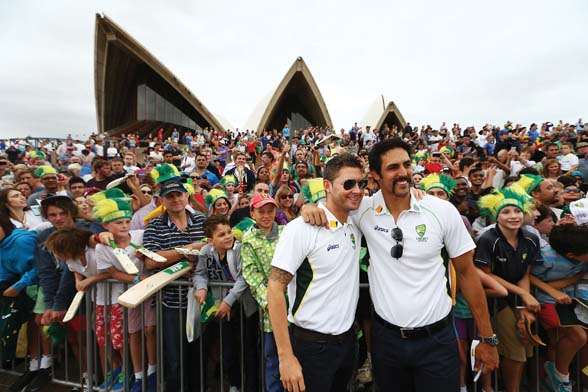 Recent Ashes winners, but both with the home advantage. Can the Australians take their form on the road? (Photo by Getty Images)
Recent Ashes winners, but both with the home advantage. Can the Australians take their form on the road? (Photo by Getty Images)Anderson, the one England bowler camped at the pantheon's portico, claims to have regained touch with his cojones. We'll have to wait and see what that means. His greatness is nothing if not flexible, and he reserves the right to play badly against Australians when they're on top. Stuart Broad seems to be losing efficacy, and his contributions with the bat have waned somewhat, even as a lower-order hanger-on. Durham seamer Mark Wood has proved a wicket-taker and might be an inspired addition. The English are one "X-factor" quick bowler, and possibly a good spinner, away but might currently find 20 wickets beyond them. Wood's form in the New Zealand series will have Australia's top-order thinking.
In England, it's not always easy to tell when spinners will figure. Lyon is improving all the time, but seems to lack a certain quality the most troublesome tweakers have: when they dominate, they can be unplayable, therefore inexpensive. Even Lyon's big hauls come at big cost. England are in a worse position, spin-wise. The English have always played their best cricket at home. The Australians have, up to the Caribbean series, been sailing unimpeded on a full sea of success, the core of their Test team buoyed by their World Cup accomplishment. They'll be even hungrier by the time they reach English shores. They haven't won in England since 2001. Almost every player is now either in career-best form, or a few county hit-outs away from it. But the pitiable Poms' turn-around might have begun. And after all, victory in two of those home series since 2001 was supposed to go to Australia. The Ashes can be fertile soil for unforeseen flowerings of English talent. All it needs is a chance and encouragement. Maybe soom prayers wouldn't go astray ...
Australia, 3-1.

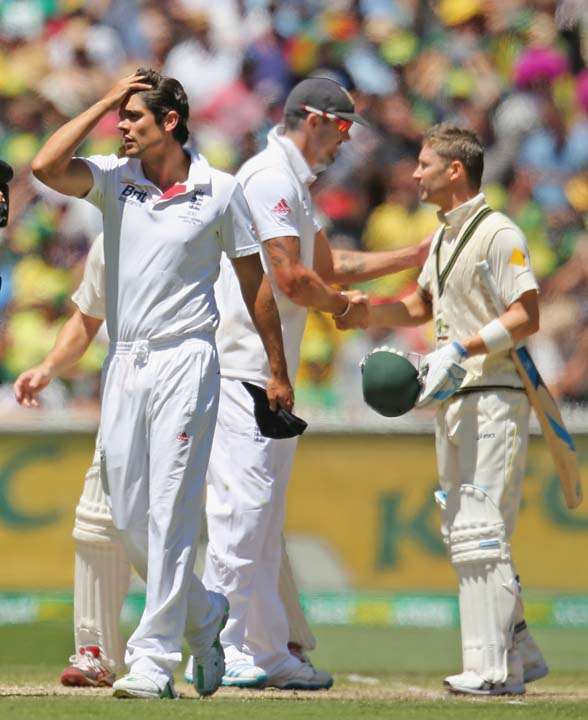
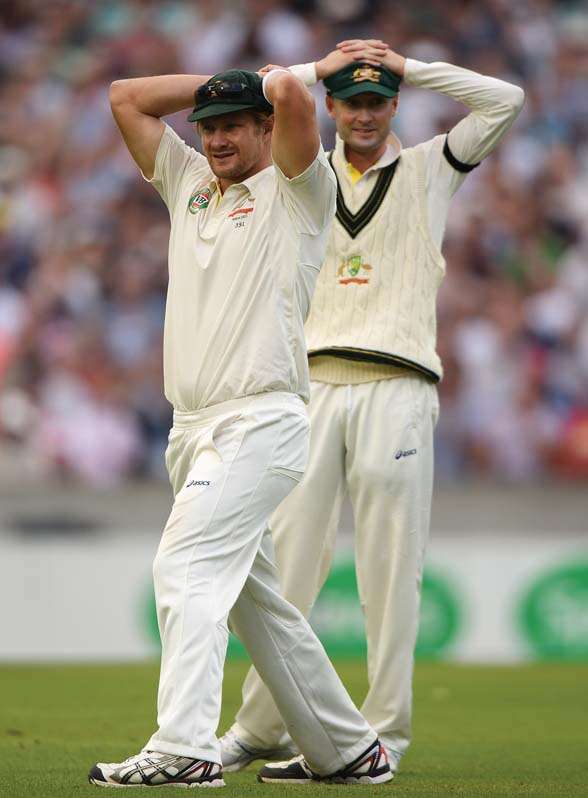
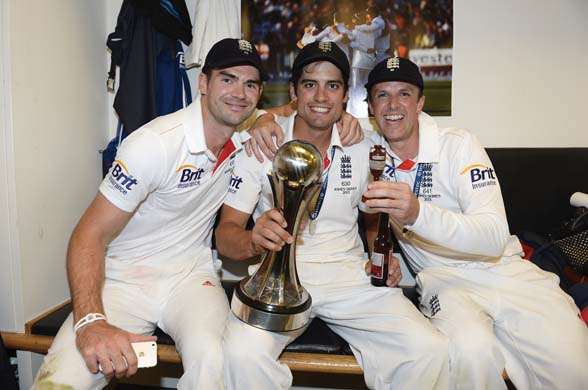
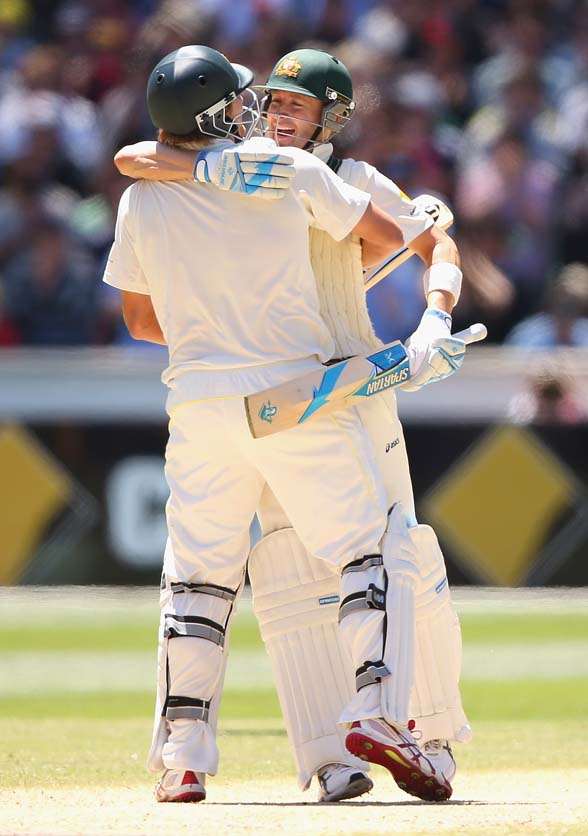



.png&h=115&w=225&c=1&s=1)


